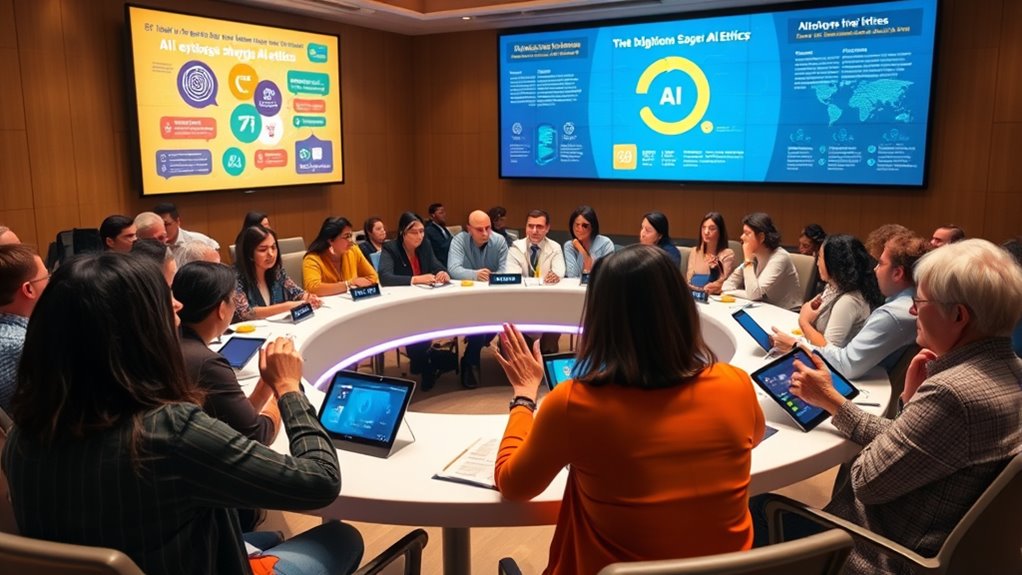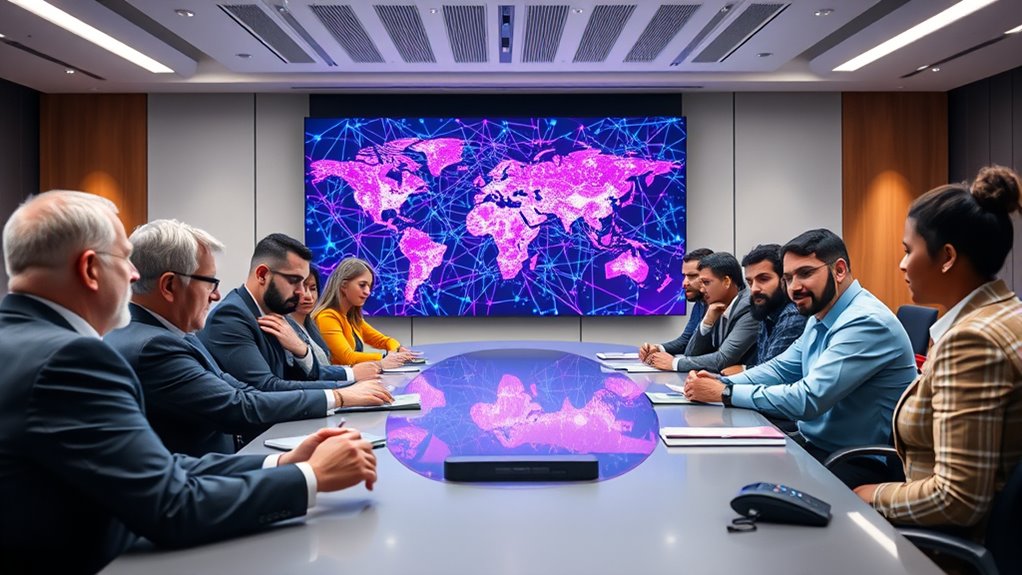To truly include citizens in the UN’s Global Dialogue on AI, you need meaningful participation that goes beyond token consultations. This means creating accessible platforms, engaging diverse communities, and giving marginalized groups a real voice. Without transparent processes and mechanisms to incorporate public input, decision-making risks becoming elitist and disconnected from societal needs. If you keep exploring, you’ll understand how building trust and inclusive strategies can shape a more equitable AI governance future.
Key Takeaways
- Inclusive citizen participation ensures AI policies reflect societal values and address diverse regional concerns.
- Establishing systematic methods for gathering public input enhances transparency and legitimacy.
- Creating a central UN AI office can facilitate meaningful stakeholder engagement and oversight.
- Addressing language, cultural, and technical barriers is essential for equitable citizen involvement.
- Empowering marginalized communities prevents elitist decision-making and promotes fair AI governance.
Top picks for "global dialogue give"
Open Amazon search results for this keyword.
As an affiliate, we earn on qualifying purchases.
The Current State of Global AI Governance and Citizen Exclusion

Despite recent efforts, the global AI governance landscape remains fragmented and still in its early stages. You’ll find multiple frameworks worldwide, like the OECD AI Principles, ISO standards, and the U.S. NIST framework, but they often struggle to connect and work together. Different regions develop their own rules, with some countries in Africa and Latin America participating in cross-border initiatives, yet overall capacity and development vary widely. The UN’s new bodies, such as the Global Dialogue on AI Governance, aim to build an inclusive framework, but they’re still just starting out. Meanwhile, citizen voices are largely missing from these efforts. Decision-making mainly involves governments, industry, and experts, leaving ordinary people without a direct say, which deepens democratic gaps in AI policy. Only 7 nations participate in all major initiatives, highlighting the need for more inclusive global engagement. Strengthening international cooperation is essential to ensure diverse stakeholder involvement and to develop more equitable policies.
Why Citizen Participation Matters in AI Policy-Making

Citizen participation plays a pivotal role in shaping AI policies that reflect society’s values and needs. By engaging directly, you help guarantee AI systems are inclusive, transparent, and accountable. Here’s why your involvement matters:
- AI tools can analyze and summarize large amounts of citizen input, making participation manageable and impactful. Enhanced Decision-Making allows policymakers to better understand community priorities and craft more effective solutions.
- Natural language processing helps synthesize diverse views, breaking language barriers and promoting cultural inclusivity. This technology facilitates more equitable Public Engagement, ensuring voices from different backgrounds are heard.
- Public engagement builds trust, showing that governance responds to local concerns and improves legitimacy.
When you participate, you contribute to ethical AI development, highlight potential biases, and help craft policies that protect marginalized groups. Your voice ensures AI governance aligns with societal interests, fostering responsible innovation and democratic legitimacy.
Challenges in Ensuring Inclusive Representation at the UN Platform

You face significant hurdles when it comes to ensuring all voices are heard at the UN AI platform. Power imbalances favor wealthy nations and technical elites, often sidelining marginalized groups and developing countries. Without better structures and inclusive processes, meaningful citizen participation remains out of reach. Involving diverse communities is essential for legitimacy and effectiveness, as lessons from climate governance demonstrate that inclusive participation leads to more relevant and equitable policies. Incorporating Pimple Patch strategies into these processes could serve as a metaphor for targeted, effective engagement that addresses specific concerns within complex systems.
Power Imbalance Risks
Power imbalances threaten the inclusivity of the UN’s AI governance efforts, as influential states and large corporations often dominate the conversation. You need to recognize that wealthy nations control much of the AI infrastructure and data, sidelining developing countries and smaller states. Large tech companies wield significant influence through their expertise and resources, shaping policies that favor their interests. Additionally, geopolitical rivalries can cause powerful actors to prioritize national agendas over global fairness. To address these risks:
- Wealthy nations and corporations concentrate power, limiting diverse participation.
- Technical complexity and resource gaps hinder meaningful engagement from less-developed regions.
- Exclusive decision-making structures marginalize civil society and grassroots voices, risking skewed governance.
- Research shows that the concentration of AI innovation hubs in a few countries amplifies these disparities, making it harder for marginalized groups to have a voice. Furthermore, the digital divide exacerbates these inequalities, as unequal access to technology hampers equitable participation.
Structural Participation Barriers
Ensuring inclusive representation at the UN AI governance platform faces significant institutional and procedural hurdles. You must navigate coordination challenges with existing bodies like OECD, GPAI, and IGF, risking overlaps and confusion without clear role distinctions. Engaging diverse stakeholders—government leaders, civil society, academia, and the private sector—requires careful structuring to guarantee meaningful participation. Specialized working groups are needed to address technical and sector-specific issues, but current processes lack systematic ways to gather input from varied regions and backgrounds, limiting true inclusivity. Additionally, a centralized AI office within the UN Secretariat is vital to manage stakeholder engagement effectively. Effective coordination mechanisms are essential for streamlining efforts across multiple organizations. Without these structural reforms, the platform risks marginalizing voices from less-resourced countries and underrepresented communities, hindering all-encompassing global AI governance. Furthermore, fostering inclusive participation is crucial to ensure that diverse perspectives are incorporated into decision-making processes, thereby enhancing legitimacy and effectiveness.
The Risks of Elitist Decision-Making in AI Governance

When decision-making in AI governance is dominated by a small elite, your voice and those of marginalized groups often get ignored. This concentration of power can lead to policies that favor corporate profits and strategic interests over public safety and ethics. Without broader public accountability, trust in AI systems and their governance risks eroding altogether. Incorporating public participation in decision-making processes can help ensure diverse perspectives are considered and foster greater transparency.
Exclusion of Diverse Voices
Excluding diverse voices from AI governance processes risks creating decisions that overlook the needs and perspectives of marginalized communities. When regional, socio-economic, and cultural differences aren’t included, policies may worsen inequalities or ignore unique risks. To prevent this, consider:
- Developing countries often lack representation, leaving regional concerns unaddressed.
- Civil society and grassroots groups face barriers to participation, limiting community input.
- Language, technical, and cultural barriers exclude many from meaningful engagement.
Additionally, inclusive participation can help identify specific risks and needs that might otherwise be overlooked, ensuring more comprehensive and effective policies. Ensuring human rights expertise is integrated into the process is crucial for creating inclusive and effective AI policies. Without intentional efforts, power imbalances persist, and decision-making remains concentrated among elites. These gaps threaten to reinforce existing inequalities and undermine social justice. Ensuring diverse voices are genuinely included isn’t just fair—it’s essential for effective, equitable AI governance that serves everyone.
Risk of Governance Concentration
Centralized AI governance can lead to elitist decision-making, where a limited group holds disproportionate influence over policies that affect everyone. This concentration of power often means diverse perspectives are overlooked, increasing the risk of bias and making governance less transparent. Many organizations lack enough public involvement, which further limits accountability and risks creating policies that favor the few over the many. Expertise is also concentrated in a small number of bodies with limited subject matter knowledge, especially in developing countries. This imbalance hampers collaborative efforts needed for effective governance. As AI technologies evolve rapidly, centralized decision-making struggles to adapt, heightening regulatory challenges. Without broader participation, the risk of entrenched interests dominating AI policies grows, threatening fairness and the equitable distribution of AI benefits. Additionally, understanding the operating hours of supermarkets exemplifies how transparency and public awareness are crucial in governance processes.
Limited Public Accountability
Limited public accountability in AI governance raises significant concerns about elitist decision-making. If the UN’s efforts prioritize government officials and corporate leaders over public voices, policies risk becoming disconnected from societal needs. You should consider these key issues:
- Lack of Transparency: When processes and outcomes aren’t openly shared, public trust diminishes.
- Inadequate Representation: Without meaningful participation, diverse communities’ concerns go unheard.
- Risk of Disconnection: Decisions made by a narrow group may overlook broader societal impacts of AI.
To address this, mechanisms must be in place to ensure that citizens’ input is genuinely considered. Transparency, inclusive participation, and accessible communication are essential to prevent elitist decision-making from dominating AI governance.
Learning From Past International Negotiations on Digital Rights

Learning from past international negotiations on digital rights reveals that while frameworks like the WSIS Declaration and national recognitions set important precedents, they often fell short in translating principles into enforceable policies. The WSIS Declaration, for example, acknowledged human rights but didn’t guarantee practical implementation. Similarly, countries like France, Estonia, and Finland recognized internet access as a fundamental right, yet enforcement varies widely. Voluntary initiatives like the GNI faced criticism for lacking binding power, and jurisdictional issues complicated enforcement across borders. Trade agreements such as TPP and the DMCA introduced policies that sometimes conflicted with privacy rights. These experiences highlight the need for stronger, legally binding international mechanisms and active public participation to assure digital rights are protected and upheld effectively. Additionally, understanding asset division strategies from divorce proceedings can inform the development of fair and enforceable international agreements on digital rights.
Practical Steps for Incorporating Public Voices in AI Discussions

You can start by establishing transparent consultation platforms that clearly connect public input to decision-making. Promoting inclusive digital engagement guarantees diverse voices, especially from marginalized and developing nations, are heard. Supporting accessible participation tools helps level the playing field and strengthen global AI governance. Incorporating public health benefits into the discussion ensures that AI development aligns with societal well-being and ethical standards.
Establish Transparent Consultation Platforms
To effectively incorporate public voices in AI discussions, establishing transparent consultation platforms is essential. These platforms should have a global scope, involving diverse stakeholders through initiatives like the UN’s AI for Good. Forming strong institutional partnerships helps develop solutions aligned with international goals. You need robust digital infrastructure to host consultations and clear legal frameworks to guarantee they operate within recognized standards. Equally important is resource allocation for ongoing maintenance and updates.
Implementing necessary cookies ensures the platform functions smoothly and securely, facilitating trust and participation from a broad audience. Consider these practical steps:
- Develop secure, accessible online platforms that facilitate open dialogue.
- Create legal guidelines to uphold transparency and protect participants.
- Allocate resources to ensure continuous platform improvements and outreach.
Promote Inclusive Digital Engagement
Building on the foundation of transparent consultation platforms, promoting inclusive digital engagement guarantees that diverse voices are actively heard in AI discussions. You can use AI-driven feedback systems and real-time analysis to better understand community needs, ensuring that public input shapes AI policies. Platforms like Inclusive.AI leverage DAO mechanisms to involve underserved populations through deliberation and voting, giving marginalized groups a voice. Incorporating arts and humanities institutions provides accessible forums for meaningful dialogue, even for those without technical expertise. By fostering digital literacy initiatives, you empower more people to participate confidently. Engaging multiple stakeholders—government, civil society, and marginalized communities—ensures that AI development reflects varied perspectives. Trustworthy information is essential to guide inclusive engagement and build public confidence in AI governance. This approach creates a more inclusive, equitable dialogue that aligns AI progress with societal values and needs.
Support Participation From Developing Nations
Supporting participation from developing nations is essential to guaranteeing that AI governance reflects diverse global perspectives. Without their inclusion, policies risk ignoring societal needs and local contexts. To achieve this, consider these practical steps:
- Establish quotas or reserved seats for developing nations on UN AI advisory panels to ensure representation.
- Launch UN-coordinated training programs to build technical, legal, and policy expertise in these countries.
- Create accessible channels for citizen feedback, like multilingual online platforms, regional consultations, and mobile tools, to capture grassroots voices.
Building Trust Through Transparent and Accessible Engagement Processes

Establishing trust in AI governance hinges on creating transparent and accessible engagement processes that invite meaningful participation from all stakeholders. The Global Dialogue on AI Governance offers an inclusive platform where governments, civil society, and the private sector can openly share their views. By making information about discussions and decisions publicly available, you can foster trust and confidence. Regular updates and reports keep stakeholders informed, while accountability mechanisms ensure commitments are met. Independent oversight bodies can monitor transparency, and stakeholder feedback loops help refine processes. Open communication channels allow diverse voices to be heard, making decision-making more inclusive. Incorporating transparency features such as clear reporting and open forums can further enhance trust and accountability. When these practices are in place, you build credibility and foster a collaborative environment where everyone feels valued and engaged in shaping AI policies.
Supporting Developing Countries and Marginalized Communities

Access to AI infrastructure and resources in developing countries remains a significant challenge, limiting your ability to participate fully in the global AI ecosystem. To bridge this gap, focus on these key areas:
- Investing in AI hardware, cloud services, and datasets, supported by countries like India and Saudi Arabia, to build local capacity.
- Expanding AI education and training programs, especially in underserved regions, to develop skilled talent and retain expertise.
- Creating partnerships between governments, private sectors, and international organizations to improve access, address data quality issues, and promote inclusive AI applications in sectors like healthcare, agriculture, and education.
- Promoting local innovation and supporting startups to adapt AI solutions to regional needs and foster sustainable development.
Addressing these barriers is crucial for ensuring marginalized communities benefit from AI’s economic and social opportunities, fostering equitable development.
The Role of Civil Society and Grassroots Movements in Shaping Policy

Civil society and grassroots movements play a crucial role in shaping AI policy by bringing diverse, localized perspectives into global governance discussions. They ensure active participation from nonprofits, universities, grassroots groups, and community organizations, especially from the Global South, fostering cultural and geographic diversity. These groups serve as vital links between international AI rules and the real-world impacts on everyday people—workers, patients, educators, and residents near data centers. Regular inclusion of their voices helps prevent AI governance from being dominated solely by governments and corporations. Grassroots movements provide bottom-up insights, highlighting risks and benefits for marginalized populations, and advocate for transparency, accountability, and social justice. Their empowerment is essential to democratize AI policymaking and create policies rooted in lived experience and ground realities. Incorporating community-driven strategies can further enhance the effectiveness of these efforts by aligning policies with local needs and values.
Moving Beyond Dialogue: Turning Principles Into Action

Turning AI principles into effective action requires more than just dialogue; it demands concrete mechanisms that guarantee accountability and meaningful oversight. You need systems that ensure transparency, build trust, and hold stakeholders responsible. Here are three key steps:
- Establish institutional oversight bodies like scientific panels and global dialogues to promote transparent discussions and align AI governance with human rights and international law.
- Develop effective regulatory frameworks that turn broad principles into clear, enforceable rules, ensuring AI is safe, ethical, and trustworthy.
- Foster multistakeholder cooperation, integrating governments, civil society, and industry, to create adaptable, inclusive policies that reflect diverse perspectives and local realities. Signs of spoilage in data or systems must be monitored to prevent unintended consequences.
Frequently Asked Questions
How Can Citizens Directly Influence UN AI Governance Decisions?
You can directly influence UN AI governance decisions by engaging in public consultations and advocacy campaigns. Stay informed through awareness programs, participate in civil society initiatives, and utilize digital platforms to share your perspectives. Support and join organizations that represent citizen interests, and push for transparent decision-making processes. Your active involvement helps guarantee your voice is heard and considered in shaping responsible AI policies globally.
What Mechanisms Will Ensure Diverse Public Voices Are Heard?
You can trust that your voice will be heard through collective intelligence tools, open consultations, and citizen reviews integrated into the process. The Global Dialogue hosts large online discussions, polls, and citizen rapporteurs to directly represent public opinions. These mechanisms guarantee diverse perspectives are included, giving you a meaningful role in shaping AI governance. By actively participating, you help inform policies that reflect real societal values and concerns.
How Will the UN Include Marginalized and Developing Communities Effectively?
You can include marginalized and developing communities effectively by creating tailored AI literacy programs that address their specific needs and languages. Use AI-powered virtual proxies to give them a voice in global discussions, overcoming barriers like distance or disability. Guarantee their participation through transparent, inclusive processes, and involve local experts and community representatives. Collaborate with existing UN forums to amplify their perspectives, prioritizing human rights and sustainable development in all AI governance efforts.
Are There Plans to Involve Grassroots Organizations in High-Level AI Talks?
Yes, grassroots organizations are on the radar, and plans are taking shape to bring them into high-level AI talks. Think of it as planting seeds for a more inclusive future—through open calls, expert panels, and dedicated mechanisms within the UN. While the process is still in its early stages, these efforts aim to guarantee grassroots voices aren’t just heard but truly influence AI governance at the highest levels.
How Can Transparency Be Maintained in the Selection of Non-State Participants?
You can maintain transparency by establishing clear, published criteria for selecting non-state participants, and making the nomination process open to the public. Regularly publish lists of nominees and panel members, and guarantee selection is based on merit, expertise, and diversity. Involving independent oversight and multistakeholder committees prevents bias, while outreach through universities and civil society groups broadens awareness. This approach fosters trust and accountability throughout the entire process.
Conclusion
If you want AI governance to truly serve everyone, you need to make sure all voices are heard—like threads woven into a resilient fabric. The UN’s global dialogue is your chance to shape a future where citizens aren’t just spectators but active creators. Don’t let the conversation be a echo chamber for the elite. Instead, step in, speak out, and help turn promises into real change—because inclusive participation is the key to a fairer AI future.









